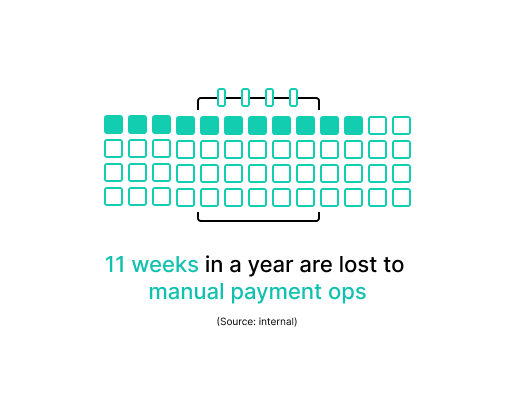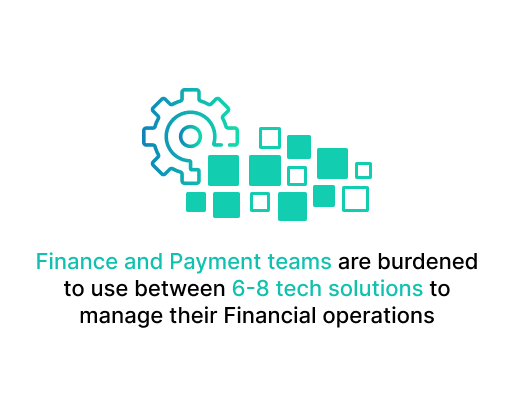Ledgers Reconciliation
Close Books Faster: Accelerate Payment Reconciliation with Confidence
Discover actionable strategies for fintech companies to expedite payment reconciliation processes, streamline operations, and maintain a competitive edge!

Amrit Mohanty
Apr 2, 2024 (Last Updated: Nov 13, 2025)

Are you spending countless hours reconciling payments and transactions? If you’re a Payment Gateway, Payment Processor, Network, or any other PSP, chances are that you find yourself struggling to keep up with the ever-increasing volumes of payment data.
In this blog post, we delve into effective strategies and real-time examples to streamline payment reconciliation processes for fintechs, making it less tedious and time-consuming. Discover how you can expedite payment reconciliation and achieve faster book closures for your business.
Payment reconciliation, the process of matching incoming and outgoing payments with corresponding invoices or transactions, is vital for ensuring accuracy and transparency in financial records. However, it can also be time-consuming and labor-intensive, especially for fintech companies dealing with high volumes of transactions.

Let's dive in.
Automate, automate, automate
Leading fintech companies are leveraging automation to drive operational efficiencies and expedite the closing of books. There are examples of saving as much as 80% of time closing books through automated reconciliation systems as compared to traditional manual processes, showcasing the transformative impact of technology on financial processes.
Fintechs have indicated that 38.9% of their payment operations are manual, compared to 37.2% for traditional finance firms. Hence, automation plays a pivotal role in accelerating payment reconciliation processes within the realm of fintech. By harnessing the power of technology, fintech companies can streamline their operations, enhance efficiency, and mitigate the risk of errors commonly associated with manual tasks. One of the key benefits of automation lies in its ability to handle repetitive tasks, such as data entry and matching transactions, with speed and accuracy. Numerous tools and software solutions tailored specifically for payment reconciliation in fintech are readily available on the market.
These platforms leverage advanced algorithms and machine learning capabilities to automate the reconciliation process comprehensively. They can seamlessly reconcile payments, detect discrepancies, and highlight exceptions for further scrutiny. Through automation, fintech firms can significantly reduce the time and resources traditionally required for manual reconciliation, enabling them to close their books swiftly and efficiently each month.
Moreover, automation not only accelerates the reconciliation process but also enhances its accuracy, thereby bolstering the overall reliability of financial data and promoting regulatory compliance. In essence, embracing automation emerges as a strategic imperative for fintech companies seeking to stay competitive, drive operational excellence, and deliver enhanced value to their clients.
Centralize data sources
Another key strategy for speeding up payment reconciliation is to centralize data sources. In many fintech companies, data is scattered across multiple systems and platforms, making it challenging to reconcile payments efficiently.
However, by centralizing data sources and seamlessly integrating disparate systems, fintech firms can streamline the entire reconciliation process. This centralized approach ensures that all pertinent payment data is readily accessible in one location, empowering finance teams to swiftly identify and match transactions. Consequently, the arduous task of hunting down missing or incomplete data is greatly mitigated, leading to substantial time savings and enhanced operational efficiency.
Moreover, centralization facilitates better data management practices, promoting accuracy and consistency in payment reconciliation procedures. Overall, the consolidation of data sources stands as a fundamental strategy for optimizing payment reconciliation workflows within fintech companies, enabling them to adapt to the demands of a rapidly evolving financial landscape.
Implement real-time reporting
Real-time reporting is essential for every organization today, and more so for fintech companies looking to stay agile and responsive. By implementing real-time reporting tools, fintechs can monitor incoming and outgoing payments in real-time, enabling faster identification of discrepancies and issues.
Real-time reporting facilitates the instantaneous monitoring of incoming and outgoing payments, enabling fintech firms to swiftly identify any discrepancies or anomalies as they occur. This capability not only expedites the reconciliation process but also empowers organizations to address potential issues preemptively before they escalate into larger problems. Moreover, real-time reporting provides unparalleled visibility into the financial performance of fintech companies, furnishing decision-makers with up-to-the-minute insights necessary for making informed, data-driven choices.
This enhanced visibility not only enables proactive management of finances, but also bolsters overall financial control. By harnessing the power of real-time reporting, fintech companies can optimize their operational efficiency, minimize risks, and seize opportunities with confidence in the rapidly evolving digital financial ecosystem.
Embrace Collaboration
Effective communication and teamwork between finance, operations, and technology departments not only accelerate procedures but also pinpoint bottlenecks and implement solutions efficiently. Regular cross-functional meetings and brainstorming sessions serve as vital forums for identifying improvement opportunities and ensuring alignment for objectives and priorities across teams. These interactions foster a culture of shared responsibility and innovation, encouraging individuals to contribute insights and ideas from diverse perspectives.
Moreover, leveraging collaboration tools and platforms enhances communication and information dissemination, promoting seamless collaboration, even in remote work settings. By embracing collaboration as a core principle, fintech firms can optimize their payment reconciliation processes, enhance operational efficiency, and ultimately deliver superior services to customers.
Continuous Improvement
Fintech companies must consistently evaluate and refine their procedures to identify inefficiencies and implement best practices that drive ongoing efficiency gains. This iterative process often entails conducting regular audits to pinpoint areas for improvement and to ensure compliance with regulatory standards. Moreover, soliciting feedback from stakeholders, including customers and internal teams, provides invaluable insights into pain points and areas ripe for enhancement.
Additionally, staying abreast of industry trends and developments is crucial, as it enables fintech firms to adopt cutting-edge technologies and methodologies that streamline reconciliation processes. By embracing a culture of continuous improvement, fintech companies can not only enhance the accuracy and efficiency of their payment reconciliation processes, but also ensure scalability and adaptability as they navigate an ever-evolving landscape. This proactive approach not only fosters operational excellence but also reinforces customer trust and confidence in the company's ability to deliver reliable financial services.

Conclusion
Expediting payment reconciliation stands as a paramount necessity for fintech enterprises striving to promptly close their financial books and sustain a competitive advantage within the rapidly evolving digital landscape of today's economy. Through the strategic utilization of automation technologies, fintech firms can significantly enhance the efficiency of their reconciliation processes. By automating repetitive tasks and reducing manual intervention, these companies can expedite the identification and resolution of discrepancies. Thereby accelerating the overall reconciliation timeline. Additionally, centralizing data sources plays a pivotal role in optimizing reconciliation procedures. By consolidating relevant financial data into a single, accessible platform, fintechs can streamline the reconciliation process, eliminating the need for manual data retrieval and manipulation across disparate systems.

